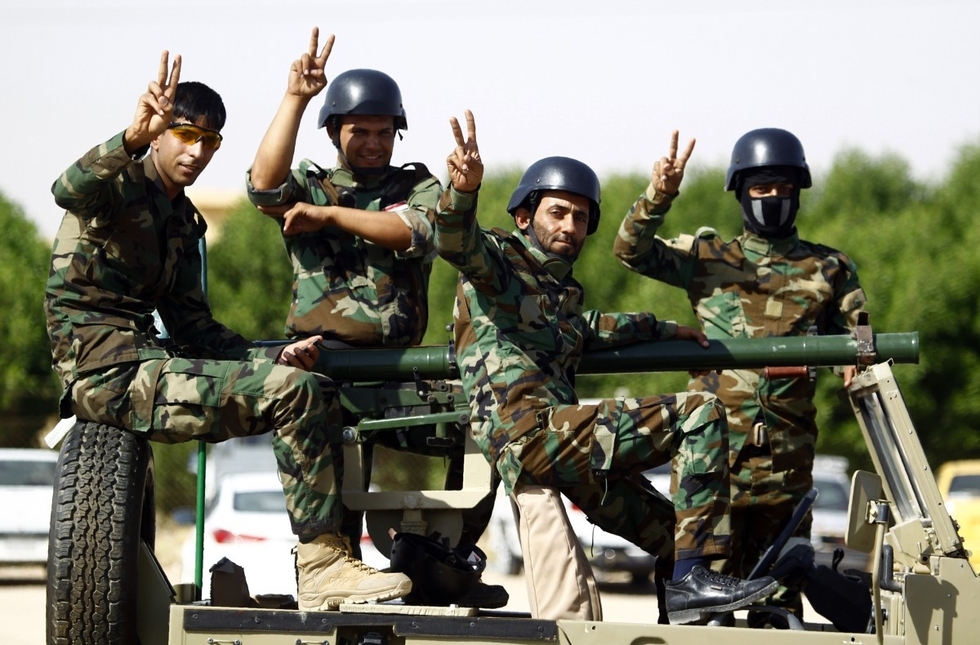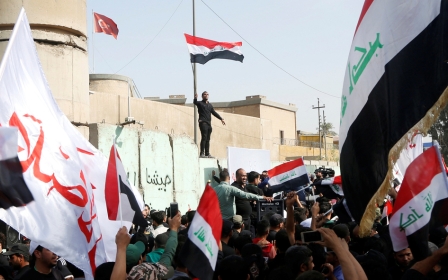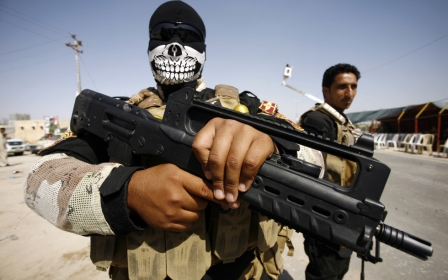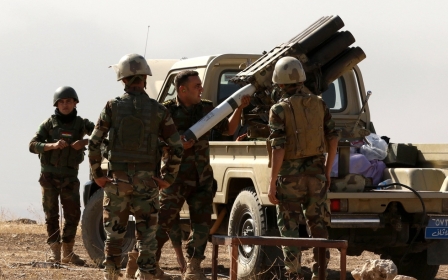Battle of Mosul: Iraq's militias 'not seeking revenge' despite fear of abuses

Members of the Iraqi militias taking part in the offensive to retake Mosul from the Islamic State (IS) group have told Middle East Eye that they will not exact revenge against Sunnis in the city for atrocities committed by the militants.
One of the most controversial issues in the offensive has been the role given to the Popular Mobilisation Units (PMUs) - paramilitary organisations that officially operate under the command of the Iraqi government.
The PMUs are overwhelmingly Shia-dominated, but there are also a number of units composed of Sunni and Christian fighters, while some are mixed-sect.
The Iraqi government, while still reliant on PMUs to some extent, has chosen not to allow the militias to enter the centre of Mosul and limited their involvement to the outskirts, a situation that some fighters have found frustrating.
“It is not my decision, but I am from Mosul and I am not sent to my own city to liberate it?” said Salem, from the Imam Ali Division, speaking to Middle East Eye.
The private, who declined to reveal his real name, fearing potential reprisals from IS, is a member of the Shabak minority, a monotheistic ethno-religious group native to Nineveh province in northern Iraq who have faced persecution from IS and other militant groups.
He spoke harshly of his experiences in Mosul after the city’s fall to IS in 2014 - he said the militants kidnapped his sisters, demanding a ransom for their return.
“We paid the ransom and got their corpses back and we left Mosul,” he said.
“The fall of Mosul saw many Sunni Arab Iraqi soldiers become IS by changing their clothes and manning the checkpoints. We did not stop because we did not want to be questioned for having the corpses of my sisters in our car. We escaped and moved to Baghdad after burying my sisters in the holy city of Najaf.”
“My reason for joining the PMUs is for everybody who has a mother or sister or daughter so they may never endure what I have endured.”
His experiences in the city left him with bitter feelings towards the people who had been his erstwhile neighbours.
“Our families were massacred by our Sunni neighbours, who forgot 200 years of living together when IS came and they sided with them,” he said.
“We do not seek revenge, but we want assurances that our people are going to exist tomorrow and not be attacked again by extremists who seek to make Mosul only Sunni.”
Allegations of abuse
The fear that the PMUs might seek to collectively punish the inhabitants of Mosul, blaming them for harbouring and supporting IS, has been a major factor in marginalising the militias’ presence in the operation to recapture the city.
Numerous human rights organisations have levelled accusations of abuse at the PMUs, alleging that the paramilitary fighters have a sectarian agenda.
On Tuesday, a new report by Amnesty International claimed that the PMUs have been responsible for torture and extrajudicial killings.
Others have expressed concern about the influence of Iran on a number of the militias, with some commanders accused of showing greater loyalty to the Islamic Republic than to the Iraqi state.
In November, Akram al-Kaabi, leader of the powerful Harakat al-Nujaba militia, said that he would overthrow the Iraqi government were he ordered to do so by Iran’s Supreme Leader Ali Khamenei.
Recently, there have been attempts to renovate the PMUs’ image - thousands of Sunni recruits from areas freed from IS rule have been drafted into militias, while their online media profiles have featured videos extolling their committment to pluralism:
Nevertheless, observers still raise concerns about the Mosul operation. Just last week, footage emerged of Qais al-Khazaali, leader of the Asaib Ahl al-Haq militia, vowing that the forthcoming battle would be “revenge for Hussein”, the historic symbolism of which many Sunnis may regard as ominous.
Ahmed, a Sunni PMU captain from Tikrit currently involved in establishing defensive lines around Mosul, said he had initially been concerned about the militias' sectarianism.
“Originally, we feared the PMUs, because IS would tell us in Tikrit that they would kill us for being Sunni,” he said, speaking to MEE through the PMU's social media channels.
However, after the successful campaign to liberate Tikrit in March 2015, he joined the PMUs himself, becoming part of Liwa Salahideen (Salahideen Brigade, named after the governorate where Tikrit is located), a Sunni militia.
“My city has returned to normal, all the people are back, the university is back, we have carnivals, celebrations, malls and most importantly we have safety,” he said of Tikrit.
“No one tells my family what they can wear and how long their beard must be or what religion is good and what religion should be killed.”
While he suggested it was not "wise" for the PMUs to be prevented from joining the main fighting, he said he and his unit did what they were ordered to do by Prime Minister Haider al-Abadi, and if they were later needed in the fighting they would willingly take part.
"Currently, we are fortifying positions and new defensive lines amid the advances of our heroic army," he said.
"We will continue up to the very edges of the city and ensure we have many strong counter-measures to IS attacks. They like to attack us with suicide trucks, but they can't get over dirt [barriers], they get stuck and we blow them up."
Tensions
Tensions are already running high between the different forces involved in taking Mosul, with many Iraqi Arabs expressing concerns over the potential expansionist goals of the Kurdish Peshmerga. Many are also deeply unhappy about the involvement of Iran and the US, with Iraqis seeing imperial ambitions on the part of what are arguably their country's two largest benefactors.
Turkish officials have in recent weeks repeatedly said they should take part in recapturing Mosul, and on Tuesday reaffirmed that their jets would continue launching air strikes against IS targets in the city. Although Turkish ground forces are not yet involved, the possibility has not been ruled out and tempers have flared over the presence of Turkish troops at the Bashiqa base near Mosul.
Perhaps most controversial were comments by Turkish President Recep Tayyip Erdogan in early October in which he appeared to suggest that non-Sunnis should not be allowed to remain in Mosul.
"After Mosul will be rescued from Daesh, only Sunni Arabs, Turkmen and Sunni Kurds should remain there," he said, using an Arabic acronym for IS, according to the pro-government Daily Sabah newspaper.
Therefore, Turkish intervention without the consent of Baghdad is likely to produce strong opposition from the PMUs in particular, many of whom also accuse Turkey of having supported IS in the past.
“If our parliament and prime minister have not agreed to this action then we will follow our prime minister's orders to consider Turkish forces as enemy combatants,” said Ali Tamimi, a staff sergent from the Abbas Combat Division, currently involved in helping clear IEDs and providing artillery for forces advancing on Mosul.
“We only want Iraqi ground forces. Turkey did not help us for two and half years and now they want to come in Mosul?”
Ahmed added that if Turkey intervenes uninvited he would “have to fight them with all my effort.”
“I hope this ... doesn't need to happen,” he added.
Erdogan has repeatedly expressed concerns over the participation of the PMUs, saying that they should play no role in the capture of Mosul. On Monday, he said that there should be no attempt at “changing the sectarian demographic balance of Mosul” by Iraqi forces, and on Tuesday warned that “30,000 Shia militants are coming” to Mosul.
Salem, the Shabak PMU fighter, said: “Turkey is stirring sectarian news by labelling PMUs as a Shia force,” he said. “There is more diversity in the PMUs than all of the Turkish army!”
The post-battle make-up of the city will be a major point of contenion for all the players involved, but most agree on one thing - once Mosul falls, IS’s powerbase in Iraq will effectively end. Though IS militants still control smaller cities and towns like Hawija and al-Qaim, the fall of Mosul will be the most decisive blow the group has faced, cutting off access to its strongholds in Syria.
Ahmed’s short-term plans following the operation are fairly straightforward.
“I will take a nice 10-day break at home with my mother and father, then I will go back to fighting,” he said.
“We still have Hawija and al-Qaim left!"
This article is available in French on Middle East Eye French edition.
Middle East Eye propose une couverture et une analyse indépendantes et incomparables du Moyen-Orient, de l’Afrique du Nord et d’autres régions du monde. Pour en savoir plus sur la reprise de ce contenu et les frais qui s’appliquent, veuillez remplir ce formulaire [en anglais]. Pour en savoir plus sur MEE, cliquez ici [en anglais].




